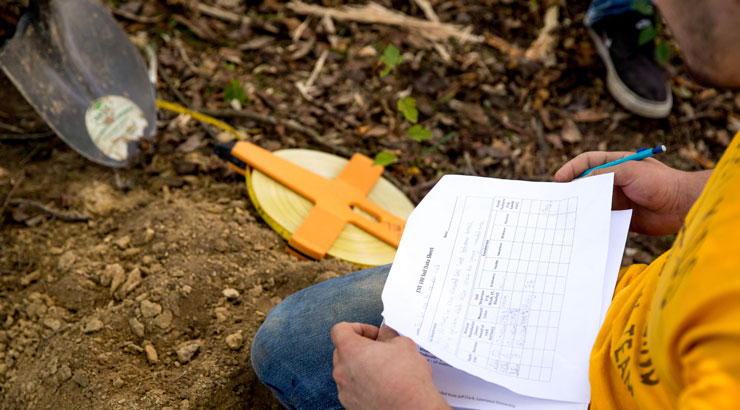
Environmental Science Program
Environmental Science Geology Degree
Unearth your potential with an environmental geology degree.
Quick Look
OFFERED AS:
Major
CREDITS REQUIRED:
120
FORMAT:
In-Person
Pure drinking water. Rich soil. Clean energy. This is what you can work toward by earning an environmental science geology degree at Kutztown University. From researching water purification strategies to understanding Earth's resources, you will graduate with the skills to effectively practice environmental management.
The geology track, which is part of our Environmental Science program, can lead to interesting and impactful careers in hydrology, resource management and environmental protection.
So, are you ready to become an environmental geoscience major?
Why choose KU for an Environmental Geology Degree
Join the environmental conservation community by pursuing the environmental geoscience major at KU. This major explores topics that range from mineral extraction and energy production to agriculture and how to rebuild disturbed environments.
Here at KU, we care about where we live and strive to protect our home.
These are some of our most important reasons why you should choose KU for your environmental major:
- Receive a first-rate education at an affordable price.
- KU’s beautiful campus can be your safe place to call home.
- Forge strong relationships with your peers and professors.
- Receive experience and training both in the field and in the lab.

Environmental Geology Degree Highlights
KU’s environmental geology degree is a great start to learning how humans interact with the planet.
This track focuses on environmental upkeep and maintaining healthy standards for water purity, soil fertility, and energy sustainability to keep our community and our environment secure.
Program Highlights:
- Learn skills in monitoring and assessing water quality and remediating pollution.
- Utilize tools to identify contamination in the subsurface.
- Evaluate clean ways to maximize energy production and distribution.
- Learn key lessons not only in how to improve the health of the environment, but also how to improve the quality of life for those most affected by your efforts.
Student Learning Outcomes
-
Environmental Science (BS)
- Students completing the B.S. in Environmental Science degree will be able to execute field and laboratory investigations based on sound scientific principals and techniques, with care and attention to detail.
- Students completing the B.S. in Environmental Science degree will be able to effectively communicate a position using data and logical reasoning in appropriate written and oral formats.
- Students completing the B.S. in Environmental Science degree will be able to work as an integral member of a multidisciplinary team to apply knowledge of the complex interactions between physical and biological realms, draw conclusions, and develop action plans.
- Students upon completing the B.S. in Environmental Science degree will be able to choose appropriate techniques for the collection, analysis, and presentation of quantitative, spatial, and temporal data.
Environmental Science is a program which lets you become a jack-of-all-trades in the sciences. You gain experience in all sorts of different sciences, so that you can become a complete and fully equipped scientist ready to tackle any sort of environmental problem.
Nicholas Rivera '24Environmental Geology FAQ
-
What can I do with an environmental geology degree?
Earning an environmental science geology degree can lead to many rewarding career paths. Here are a few job titles in this field, along with their national salaries from the U.S. Bureau of Labor Statistics (2023):
- Hydrologic Technician: $55,890
- Geological Technician: $52,440
- Environmental Scientist: $80,060
- Geoscientist: $92,580
-
What on-campus career experience can I get as an environmental geoscience major?
As an environmental geoscience major at KU, you'll have the opportunity to work directly in the field by engaging in the practices of wetland delineation, soil sampling and bedrock mapping.
Additionally, you'll be taught fundamental geological field skills and how to use geophysical equipment, such as ground-penetrating radar.
-
What environmental geology courses can I take at KU?
From studying Earth history to researching the present-day nuances of resource extraction, each environmental geology course you choose will equip you with knowledge and experience that will make you a valuable member of the environmental community.
If you want to learn which course are required to earn your environmental geology degree, refer to this checksheet for more details:
https://app.kutztown.edu/checksheets/checksheet/ULASENVGO-2202






